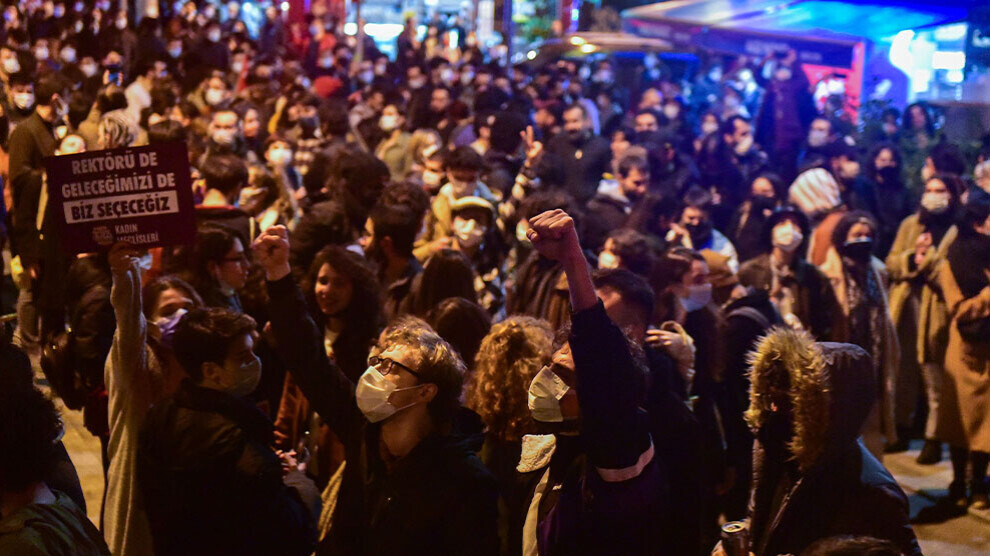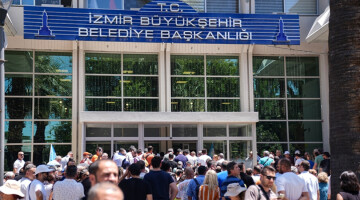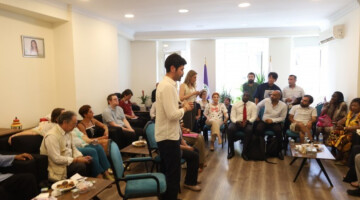Hundreds of people were arrested in Istanbul during protests by students against the appointment of Boğaziçi University rector Melih Bulu. Security forces were extremely brutal against the demonstrators, using tear gas and plastic bullets to disperse the crowd. Dozens of people were beaten and kicked by police officers, including members of parliament Barış Atay (TIP) and Musa Piroğlu (HDP). Correspondents from various news portals are among the many injured. Documentary filmmaker Kazım Kızıl was hit in the face by a plastic bullet that missed his eye by only two centimeters. Halk TV cameraman Murat Erkmen was hit in the leg by a plastic bullet.
At least 228 arrests in Istanbul
The "Forces for Labor, Peace and Democracy" alliance had called for the solidarity rally in the district of Kadıköy. The students and supporters gathered in the area which had been cordoned off by the police, despite a ban on demonstrations issued by the district administrator. Loud slogans such as "We don't want an appointed rector" and "Shoulder to shoulder against fascism" were repeatedly shouted. In addition to the ferry dock, numerous students were also intercepted and detained by police at the metro station. The Bogaziçi Solidarity initiative said 228 people were taken into custody in the crackdown. Authorities did not initially provide details. At 9 p.m. local time, people in Kadiköy took to balconies and windows to bang on pots and pans as a sign of solidarity with the students of Boğaziçi University.
Boğaziçi Solidarity: resistance continues
A solidarity rally in the capital Ankara was also violently attacked by the police. One participant was beaten unconscious, and there is talk of at least seventy arrests. Of the 159 people arrested in Istanbul on Monday, sixty remain in police custody, lawyer Gökhan Soysal said. The lawyer, who represents some of those arrested, belongs to the leftist ÇHD Lawyers Association. Meanwhile, the Boğaziçi Solidarity and other initiatives have announced that they will continue their opposition to the conditions at the country's universities, which resemble an "open prison in a state of emergency."
Protests for a month
Students at Boğaziçi University have been protesting against the new head of their university since early January. President Recep Tayyip Erdogan had appointed Melih Bulu, who was a candidate for deputy for the AKP in 2015, on New Year's Day. Since the presidential system came into effect in July 2018, the AKP leader alone has been authorized to appoint rectors at state universities. Universities had already been deprived of the right to elect their own directors under the state of emergency following the 2016 coup attempt.
Students criticized, among other things, Bulu's closeness to the AKP. But they also condemned the appointment as undemocratic and against the university's tradition of electing its directors itself. The student body calls the new director a "trustee". They see the government's fear of a new Gezi uprising as the reason for the brutal violence against the protests.
Storm of bigoted agitation
The protests were most recently fueled by the arrest of two students over the weekend. Doğu Demirtaş and Selahattin Uğuzeş were arrested in connection with an art faculty exhibition on the university campus on the grounds that one of the images was blasphemous and denigrated Islam. The image, decorated with small LGBTI flags, shows the mosque of Mecca in Saudi Arabia with a montage of the mythical snake woman Şahmaran. The exhibition, organized by the art faculty of Boğaziçi University, was part of the protest camp on the campus grounds. Due to the installation of around 300 pictures, a storm of bigoted agitation was unleashed by the government, in which Islamist conservative media actively participated.












